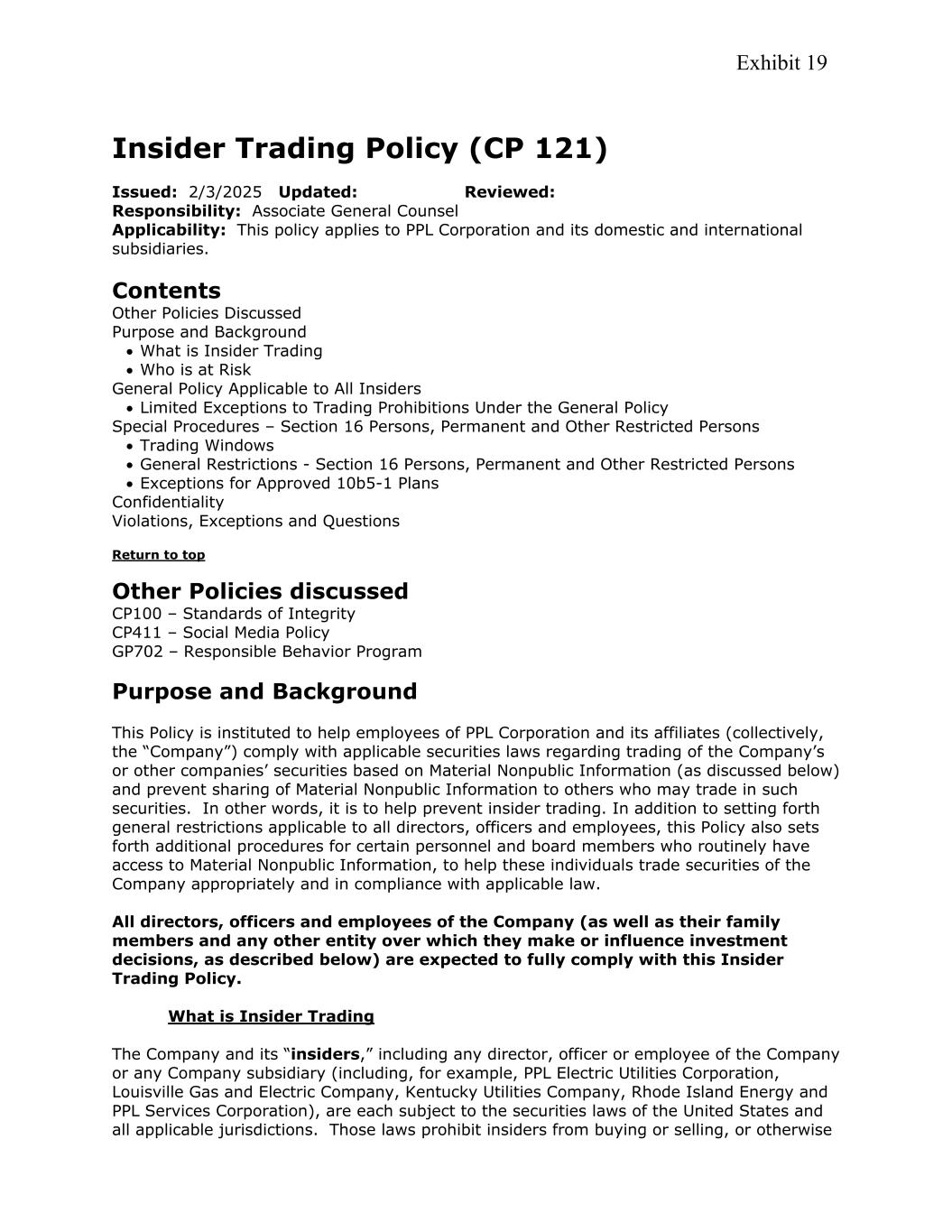
Insider Trading Policy (CP 121) Issued: 2/3/2025 Updated: Reviewed: Responsibility: Associate General Counsel Applicability: This policy applies to PPL Corporation and its domestic and international subsidiaries. Contents Other Policies Discussed Purpose and Background What is Insider Trading Who is at Risk General Policy Applicable to All Insiders Limited Exceptions to Trading Prohibitions Under the General Policy Special Procedures – Section 16 Persons, Permanent and Other Restricted Persons Trading Windows General Restrictions - Section 16 Persons, Permanent and Other Restricted Persons Exceptions for Approved 10b5-1 Plans Confidentiality Violations, Exceptions and Questions Return to top Other Policies discussed CP100 – Standards of Integrity CP411 – Social Media Policy GP702 – Responsible Behavior Program Purpose and Background This Policy is instituted to help employees of PPL Corporation and its affiliates (collectively, the “Company”) comply with applicable securities laws regarding trading of the Company’s or other companies’ securities based on Material Nonpublic Information (as discussed below) and prevent sharing of Material Nonpublic Information to others who may trade in such securities. In other words, it is to help prevent insider trading. In addition to setting forth general restrictions applicable to all directors, officers and employees, this Policy also sets forth additional procedures for certain personnel and board members who routinely have access to Material Nonpublic Information, to help these individuals trade securities of the Company appropriately and in compliance with applicable law. All directors, officers and employees of the Company (as well as their family members and any other entity over which they make or influence investment decisions, as described below) are expected to fully comply with this Insider Trading Policy. What is Insider Trading The Company and its “insiders,” including any director, officer or employee of the Company or any Company subsidiary (including, for example, PPL Electric Utilities Corporation, Louisville Gas and Electric Company, Kentucky Utilities Company, Rhode Island Energy and PPL Services Corporation), are each subject to the securities laws of the United States and all applicable jurisdictions. Those laws prohibit insiders from buying or selling, or otherwise Exhibit 19
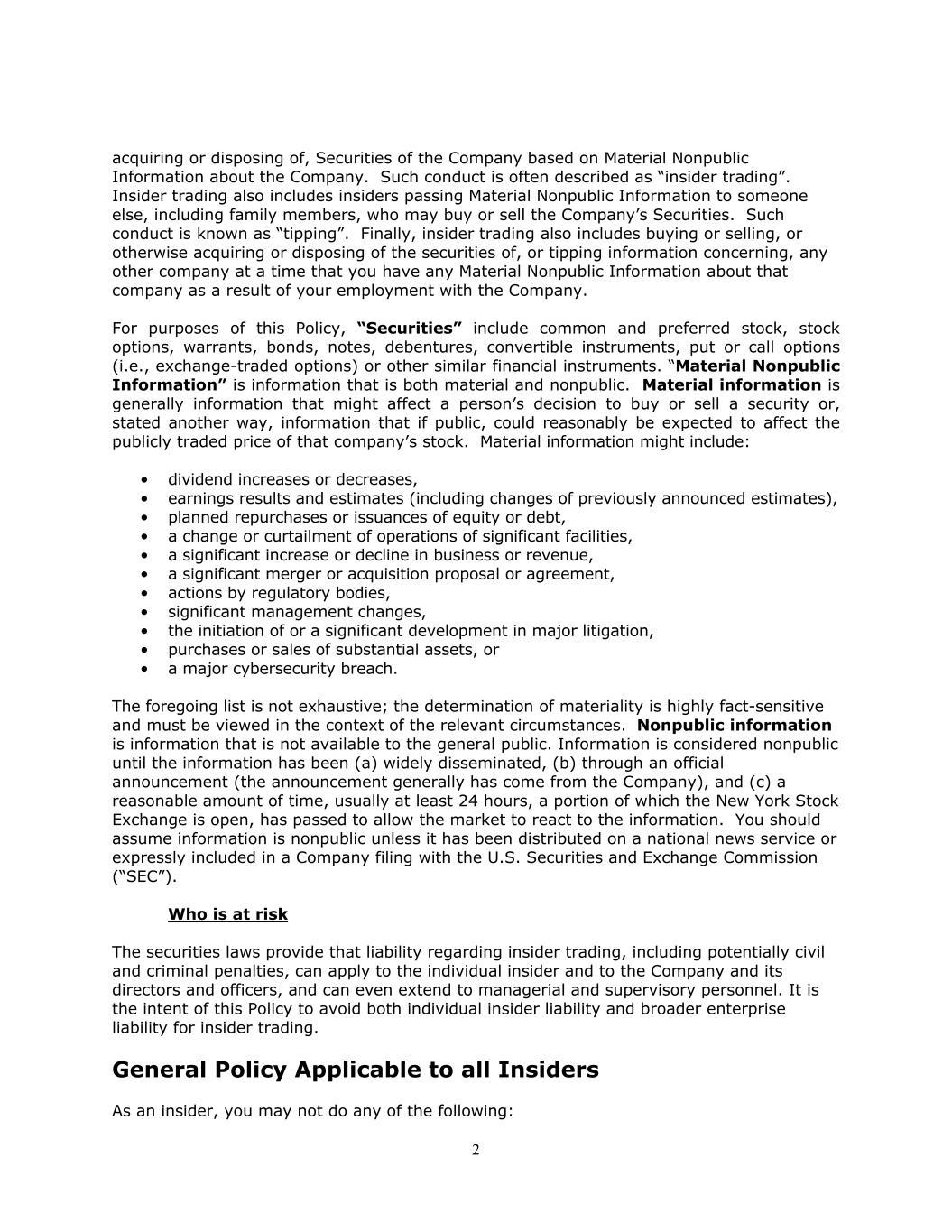
2 acquiring or disposing of, Securities of the Company based on Material Nonpublic Information about the Company. Such conduct is often described as “insider trading”. Insider trading also includes insiders passing Material Nonpublic Information to someone else, including family members, who may buy or sell the Company’s Securities. Such conduct is known as “tipping”. Finally, insider trading also includes buying or selling, or otherwise acquiring or disposing of the securities of, or tipping information concerning, any other company at a time that you have any Material Nonpublic Information about that company as a result of your employment with the Company. For purposes of this Policy, “Securities” include common and preferred stock, stock options, warrants, bonds, notes, debentures, convertible instruments, put or call options (i.e., exchange-traded options) or other similar financial instruments. “Material Nonpublic Information” is information that is both material and nonpublic. Material information is generally information that might affect a person’s decision to buy or sell a security or, stated another way, information that if public, could reasonably be expected to affect the publicly traded price of that company’s stock. Material information might include: • dividend increases or decreases, • earnings results and estimates (including changes of previously announced estimates), • planned repurchases or issuances of equity or debt, • a change or curtailment of operations of significant facilities, • a significant increase or decline in business or revenue, • a significant merger or acquisition proposal or agreement, • actions by regulatory bodies, • significant management changes, • the initiation of or a significant development in major litigation, • purchases or sales of substantial assets, or • a major cybersecurity breach. The foregoing list is not exhaustive; the determination of materiality is highly fact-sensitive and must be viewed in the context of the relevant circumstances. Nonpublic information is information that is not available to the general public. Information is considered nonpublic until the information has been (a) widely disseminated, (b) through an official announcement (the announcement generally has come from the Company), and (c) a reasonable amount of time, usually at least 24 hours, a portion of which the New York Stock Exchange is open, has passed to allow the market to react to the information. You should assume information is nonpublic unless it has been distributed on a national news service or expressly included in a Company filing with the U.S. Securities and Exchange Commission (“SEC”). Who is at risk The securities laws provide that liability regarding insider trading, including potentially civil and criminal penalties, can apply to the individual insider and to the Company and its directors and officers, and can even extend to managerial and supervisory personnel. It is the intent of this Policy to avoid both individual insider liability and broader enterprise liability for insider trading. General Policy Applicable to all Insiders As an insider, you may not do any of the following:
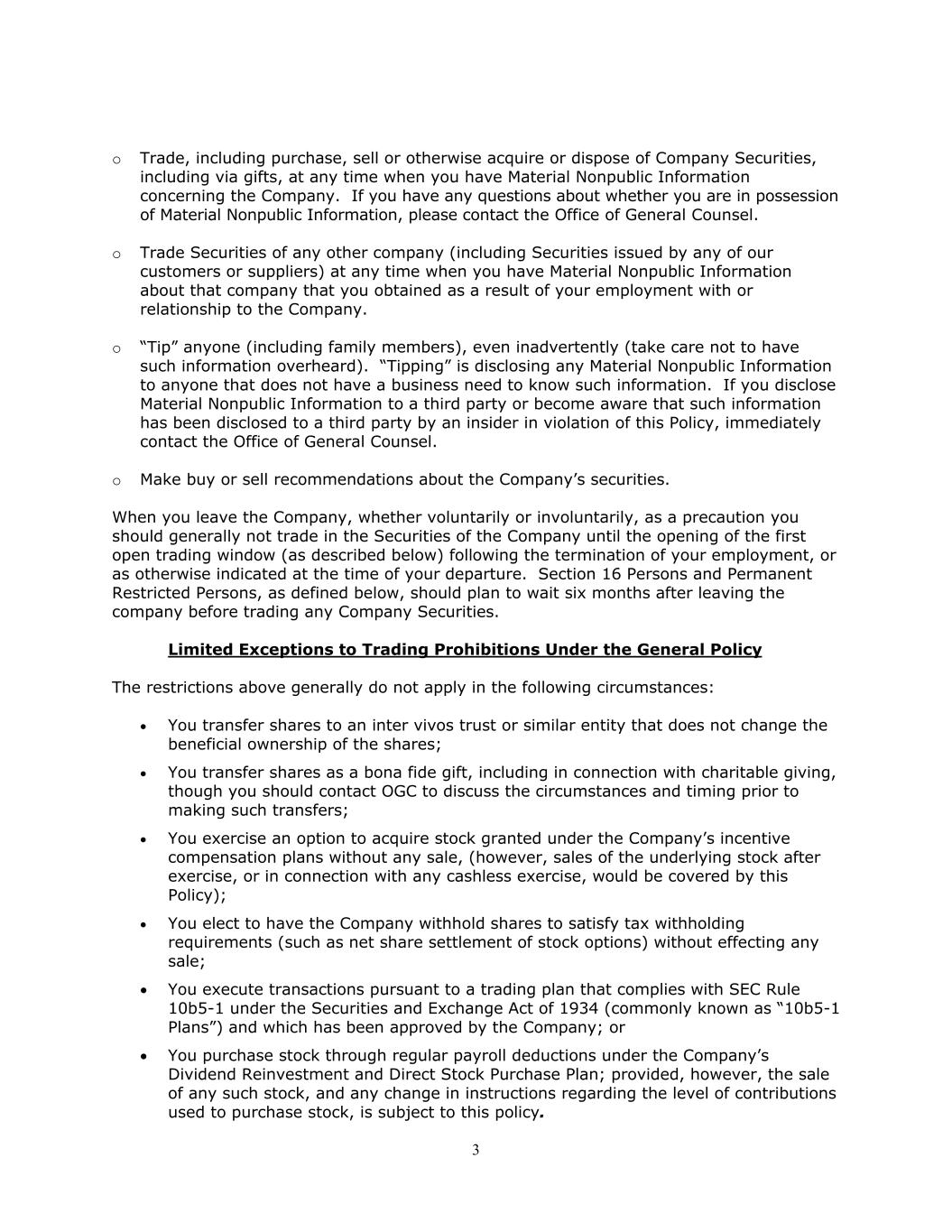
3 o Trade, including purchase, sell or otherwise acquire or dispose of Company Securities, including via gifts, at any time when you have Material Nonpublic Information concerning the Company. If you have any questions about whether you are in possession of Material Nonpublic Information, please contact the Office of General Counsel. o Trade Securities of any other company (including Securities issued by any of our customers or suppliers) at any time when you have Material Nonpublic Information about that company that you obtained as a result of your employment with or relationship to the Company. o “Tip” anyone (including family members), even inadvertently (take care not to have such information overheard). “Tipping” is disclosing any Material Nonpublic Information to anyone that does not have a business need to know such information. If you disclose Material Nonpublic Information to a third party or become aware that such information has been disclosed to a third party by an insider in violation of this Policy, immediately contact the Office of General Counsel. o Make buy or sell recommendations about the Company’s securities. When you leave the Company, whether voluntarily or involuntarily, as a precaution you should generally not trade in the Securities of the Company until the opening of the first open trading window (as described below) following the termination of your employment, or as otherwise indicated at the time of your departure. Section 16 Persons and Permanent Restricted Persons, as defined below, should plan to wait six months after leaving the company before trading any Company Securities. Limited Exceptions to Trading Prohibitions Under the General Policy The restrictions above generally do not apply in the following circumstances: You transfer shares to an inter vivos trust or similar entity that does not change the beneficial ownership of the shares; You transfer shares as a bona fide gift, including in connection with charitable giving, though you should contact OGC to discuss the circumstances and timing prior to making such transfers; You exercise an option to acquire stock granted under the Company’s incentive compensation plans without any sale, (however, sales of the underlying stock after exercise, or in connection with any cashless exercise, would be covered by this Policy); You elect to have the Company withhold shares to satisfy tax withholding requirements (such as net share settlement of stock options) without effecting any sale; You execute transactions pursuant to a trading plan that complies with SEC Rule 10b5-1 under the Securities and Exchange Act of 1934 (commonly known as “10b5-1 Plans”) and which has been approved by the Company; or You purchase stock through regular payroll deductions under the Company’s Dividend Reinvestment and Direct Stock Purchase Plan; provided, however, the sale of any such stock, and any change in instructions regarding the level of contributions used to purchase stock, is subject to this policy.

4 These exceptions are fact specific. You should contact the Office of General Counsel to discuss your particular circumstances whenever you are in doubt about any trade of Securities or before attempting to rely on any of the above exceptions. Special Procedures – Section 16 Persons, Permanent and Other Restricted Persons Enhanced trading restrictions and procedures apply to (i) Section 16 Persons, which include members of the PPL Corporation Board of Directors and certain officers of the Company as defined by SEC Rule 16a-1(f) (together with any such persons’ immediate family members, and any trusts, corporations or other entities controlled by any such persons), (ii) Permanent Restricted Persons, which includes Tier 1 and Tier 2 executives who are not Section 16 Persons and certain others as determined by the Office of General Counsel, and (iii) Other Restricted Persons, which includes those who have been notified by the Office of General Counsel that they must follow the requirements this Policy because they have access to Nonpublic Information in the normal course of their duties. Prior to buying or selling, or otherwise acquiring or disposing of any shares of PPL stock, Section 16 Persons, Permanent Restricted Persons and Other Restricted Persons must contact the Office of General Counsel. Additional restrictions, set for the below, are generally based on “trading windows.” Trading Windows “Open trading windows” generally occur four times a year, typically running from the day after quarterly/annual earnings announcements to the fifteenth day of the third month in each fiscal quarter (March, June, September, and December). A “closed trading window” occurs when the Company is aware that many insiders who are subject to enhanced trading restrictions are likely aware of Material Nonpublic Information, generally in connection with the preparation of quarterly financial reports. Closed trading windows typically run from the fifteenth of the month in the third month of a fiscal quarter until the day following the announcement of earnings for that quarter, when the next open trading window begins. In certain circumstances, trading windows may not open as normal, or may close earlier than expected, based on Material Nonpublic Information that is generally known inside the Company. Even during an open trading window, certain insiders may be prohibited from trading PPL stock, because they may be aware of specific Material Nonpublic Information. For example, when a significant transaction is being contemplated, some but not all insiders may be aware of the details of the proposed transaction, and therefore restricted from trading, even in an open trading window. The Office of General Counsel will announce via email the opening and closing of trading windows to all insiders who are subject to enhanced trading restrictions, and in certain circumstances, may notify specific insiders that they should not trade, even if the trading window is open for others. Insiders should not share with anyone whether they are restricted from trading. Trading windows are designed to add an additional layer of protection with respect to insider trading, both for the Company and the individual insider, but all insiders remain subject to the general policy discussed above. Even if the trading window is open, you may not trade, or establish, modify or terminate a 10b5-1 Plan, as discussed below, without prior approval from the Office of General Counsel or if you are aware of Material Nonpublic Information.
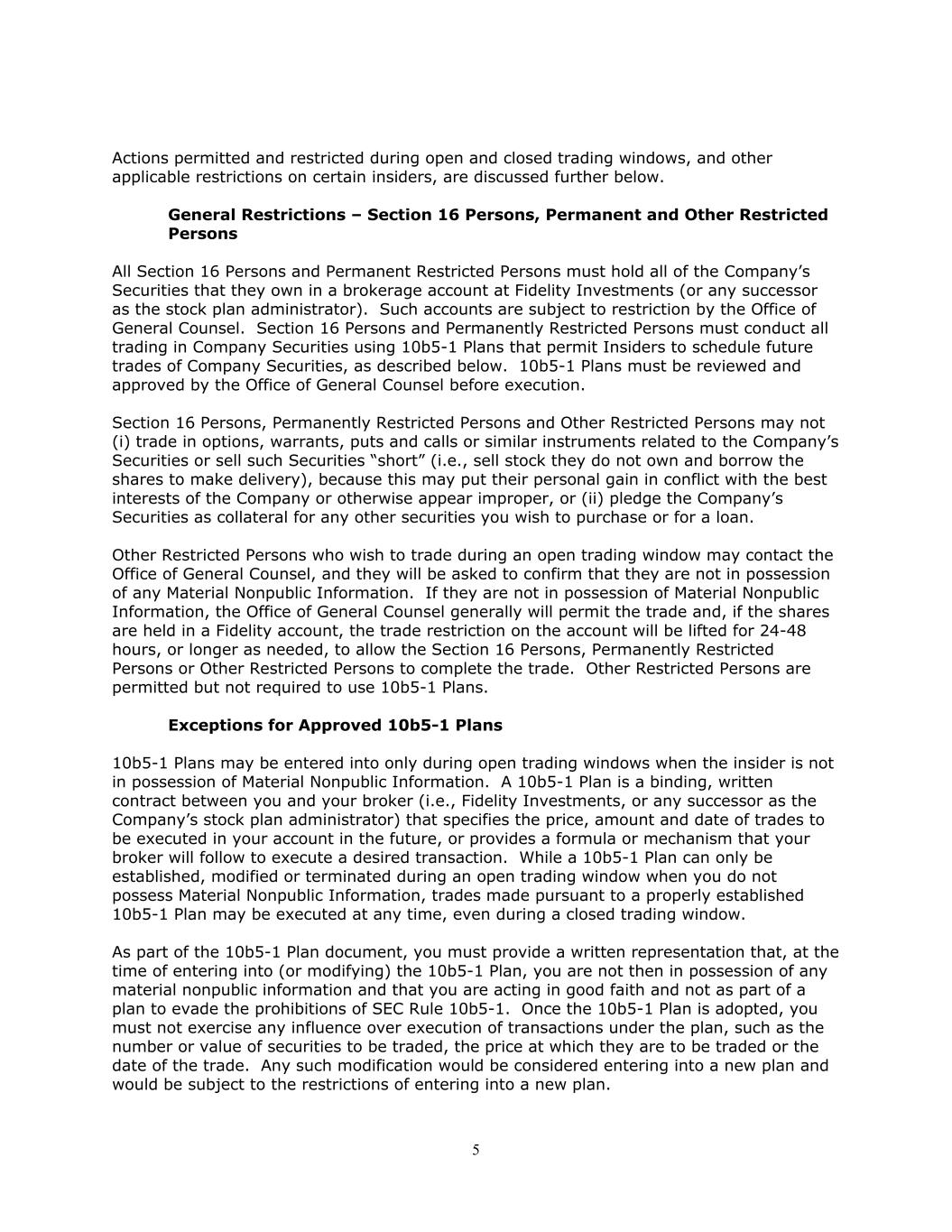
5 Actions permitted and restricted during open and closed trading windows, and other applicable restrictions on certain insiders, are discussed further below. General Restrictions – Section 16 Persons, Permanent and Other Restricted Persons All Section 16 Persons and Permanent Restricted Persons must hold all of the Company’s Securities that they own in a brokerage account at Fidelity Investments (or any successor as the stock plan administrator). Such accounts are subject to restriction by the Office of General Counsel. Section 16 Persons and Permanently Restricted Persons must conduct all trading in Company Securities using 10b5-1 Plans that permit Insiders to schedule future trades of Company Securities, as described below. 10b5-1 Plans must be reviewed and approved by the Office of General Counsel before execution. Section 16 Persons, Permanently Restricted Persons and Other Restricted Persons may not (i) trade in options, warrants, puts and calls or similar instruments related to the Company’s Securities or sell such Securities “short” (i.e., sell stock they do not own and borrow the shares to make delivery), because this may put their personal gain in conflict with the best interests of the Company or otherwise appear improper, or (ii) pledge the Company’s Securities as collateral for any other securities you wish to purchase or for a loan. Other Restricted Persons who wish to trade during an open trading window may contact the Office of General Counsel, and they will be asked to confirm that they are not in possession of any Material Nonpublic Information. If they are not in possession of Material Nonpublic Information, the Office of General Counsel generally will permit the trade and, if the shares are held in a Fidelity account, the trade restriction on the account will be lifted for 24-48 hours, or longer as needed, to allow the Section 16 Persons, Permanently Restricted Persons or Other Restricted Persons to complete the trade. Other Restricted Persons are permitted but not required to use 10b5-1 Plans. Exceptions for Approved 10b5-1 Plans 10b5-1 Plans may be entered into only during open trading windows when the insider is not in possession of Material Nonpublic Information. A 10b5-1 Plan is a binding, written contract between you and your broker (i.e., Fidelity Investments, or any successor as the Company’s stock plan administrator) that specifies the price, amount and date of trades to be executed in your account in the future, or provides a formula or mechanism that your broker will follow to execute a desired transaction. While a 10b5-1 Plan can only be established, modified or terminated during an open trading window when you do not possess Material Nonpublic Information, trades made pursuant to a properly established 10b5-1 Plan may be executed at any time, even during a closed trading window. As part of the 10b5-1 Plan document, you must provide a written representation that, at the time of entering into (or modifying) the 10b5-1 Plan, you are not then in possession of any material nonpublic information and that you are acting in good faith and not as part of a plan to evade the prohibitions of SEC Rule 10b5-1. Once the 10b5-1 Plan is adopted, you must not exercise any influence over execution of transactions under the plan, such as the number or value of securities to be traded, the price at which they are to be traded or the date of the trade. Any such modification would be considered entering into a new plan and would be subject to the restrictions of entering into a new plan.
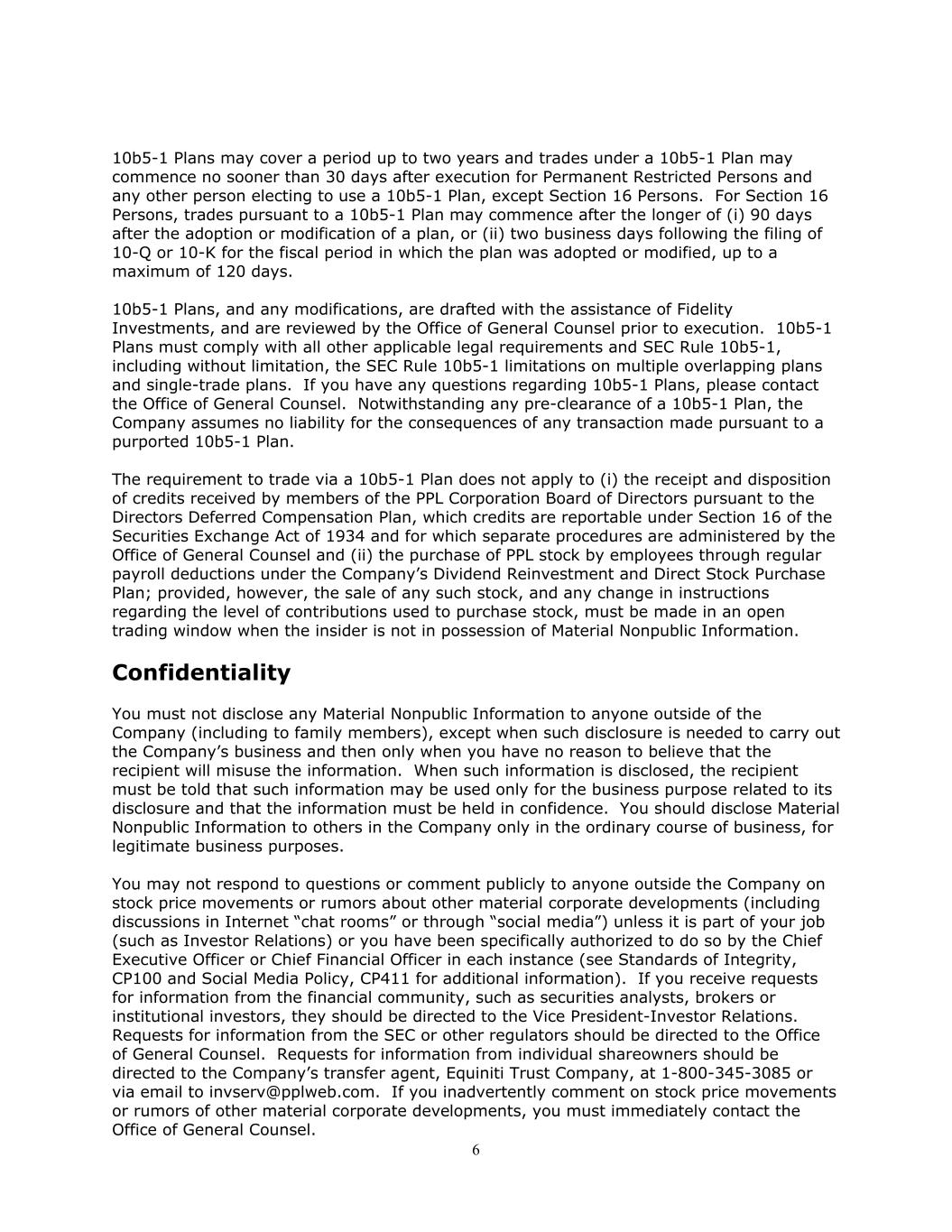
6 10b5-1 Plans may cover a period up to two years and trades under a 10b5-1 Plan may commence no sooner than 30 days after execution for Permanent Restricted Persons and any other person electing to use a 10b5-1 Plan, except Section 16 Persons. For Section 16 Persons, trades pursuant to a 10b5-1 Plan may commence after the longer of (i) 90 days after the adoption or modification of a plan, or (ii) two business days following the filing of 10-Q or 10-K for the fiscal period in which the plan was adopted or modified, up to a maximum of 120 days. 10b5-1 Plans, and any modifications, are drafted with the assistance of Fidelity Investments, and are reviewed by the Office of General Counsel prior to execution. 10b5-1 Plans must comply with all other applicable legal requirements and SEC Rule 10b5-1, including without limitation, the SEC Rule 10b5-1 limitations on multiple overlapping plans and single-trade plans. If you have any questions regarding 10b5-1 Plans, please contact the Office of General Counsel. Notwithstanding any pre-clearance of a 10b5-1 Plan, the Company assumes no liability for the consequences of any transaction made pursuant to a purported 10b5-1 Plan. The requirement to trade via a 10b5-1 Plan does not apply to (i) the receipt and disposition of credits received by members of the PPL Corporation Board of Directors pursuant to the Directors Deferred Compensation Plan, which credits are reportable under Section 16 of the Securities Exchange Act of 1934 and for which separate procedures are administered by the Office of General Counsel and (ii) the purchase of PPL stock by employees through regular payroll deductions under the Company’s Dividend Reinvestment and Direct Stock Purchase Plan; provided, however, the sale of any such stock, and any change in instructions regarding the level of contributions used to purchase stock, must be made in an open trading window when the insider is not in possession of Material Nonpublic Information. Confidentiality You must not disclose any Material Nonpublic Information to anyone outside of the Company (including to family members), except when such disclosure is needed to carry out the Company’s business and then only when you have no reason to believe that the recipient will misuse the information. When such information is disclosed, the recipient must be told that such information may be used only for the business purpose related to its disclosure and that the information must be held in confidence. You should disclose Material Nonpublic Information to others in the Company only in the ordinary course of business, for legitimate business purposes. You may not respond to questions or comment publicly to anyone outside the Company on stock price movements or rumors about other material corporate developments (including discussions in Internet “chat rooms” or through “social media”) unless it is part of your job (such as Investor Relations) or you have been specifically authorized to do so by the Chief Executive Officer or Chief Financial Officer in each instance (see Standards of Integrity, CP100 and Social Media Policy, CP411 for additional information). If you receive requests for information from the financial community, such as securities analysts, brokers or institutional investors, they should be directed to the Vice President-Investor Relations. Requests for information from the SEC or other regulators should be directed to the Office of General Counsel. Requests for information from individual shareowners should be directed to the Company’s transfer agent, Equiniti Trust Company, at 1-800-345-3085 or via email to invserv@pplweb.com. If you inadvertently comment on stock price movements or rumors of other material corporate developments, you must immediately contact the Office of General Counsel.
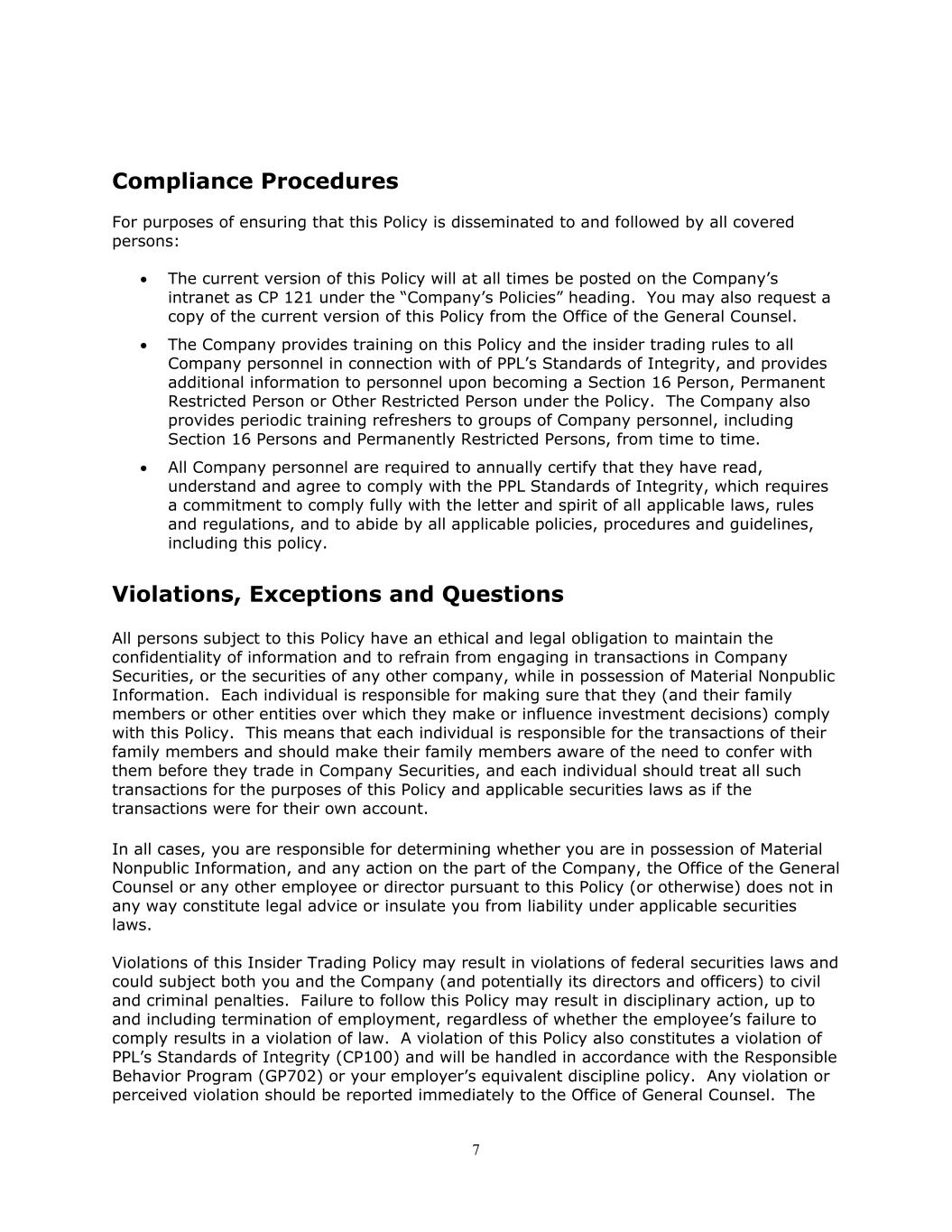
7 Compliance Procedures For purposes of ensuring that this Policy is disseminated to and followed by all covered persons: The current version of this Policy will at all times be posted on the Company’s intranet as CP 121 under the “Company’s Policies” heading. You may also request a copy of the current version of this Policy from the Office of the General Counsel. The Company provides training on this Policy and the insider trading rules to all Company personnel in connection with of PPL’s Standards of Integrity, and provides additional information to personnel upon becoming a Section 16 Person, Permanent Restricted Person or Other Restricted Person under the Policy. The Company also provides periodic training refreshers to groups of Company personnel, including Section 16 Persons and Permanently Restricted Persons, from time to time. All Company personnel are required to annually certify that they have read, understand and agree to comply with the PPL Standards of Integrity, which requires a commitment to comply fully with the letter and spirit of all applicable laws, rules and regulations, and to abide by all applicable policies, procedures and guidelines, including this policy. Violations, Exceptions and Questions All persons subject to this Policy have an ethical and legal obligation to maintain the confidentiality of information and to refrain from engaging in transactions in Company Securities, or the securities of any other company, while in possession of Material Nonpublic Information. Each individual is responsible for making sure that they (and their family members or other entities over which they make or influence investment decisions) comply with this Policy. This means that each individual is responsible for the transactions of their family members and should make their family members aware of the need to confer with them before they trade in Company Securities, and each individual should treat all such transactions for the purposes of this Policy and applicable securities laws as if the transactions were for their own account. In all cases, you are responsible for determining whether you are in possession of Material Nonpublic Information, and any action on the part of the Company, the Office of the General Counsel or any other employee or director pursuant to this Policy (or otherwise) does not in any way constitute legal advice or insulate you from liability under applicable securities laws. Violations of this Insider Trading Policy may result in violations of federal securities laws and could subject both you and the Company (and potentially its directors and officers) to civil and criminal penalties. Failure to follow this Policy may result in disciplinary action, up to and including termination of employment, regardless of whether the employee’s failure to comply results in a violation of law. A violation of this Policy also constitutes a violation of PPL’s Standards of Integrity (CP100) and will be handled in accordance with the Responsible Behavior Program (GP702) or your employer’s equivalent discipline policy. Any violation or perceived violation should be reported immediately to the Office of General Counsel. The
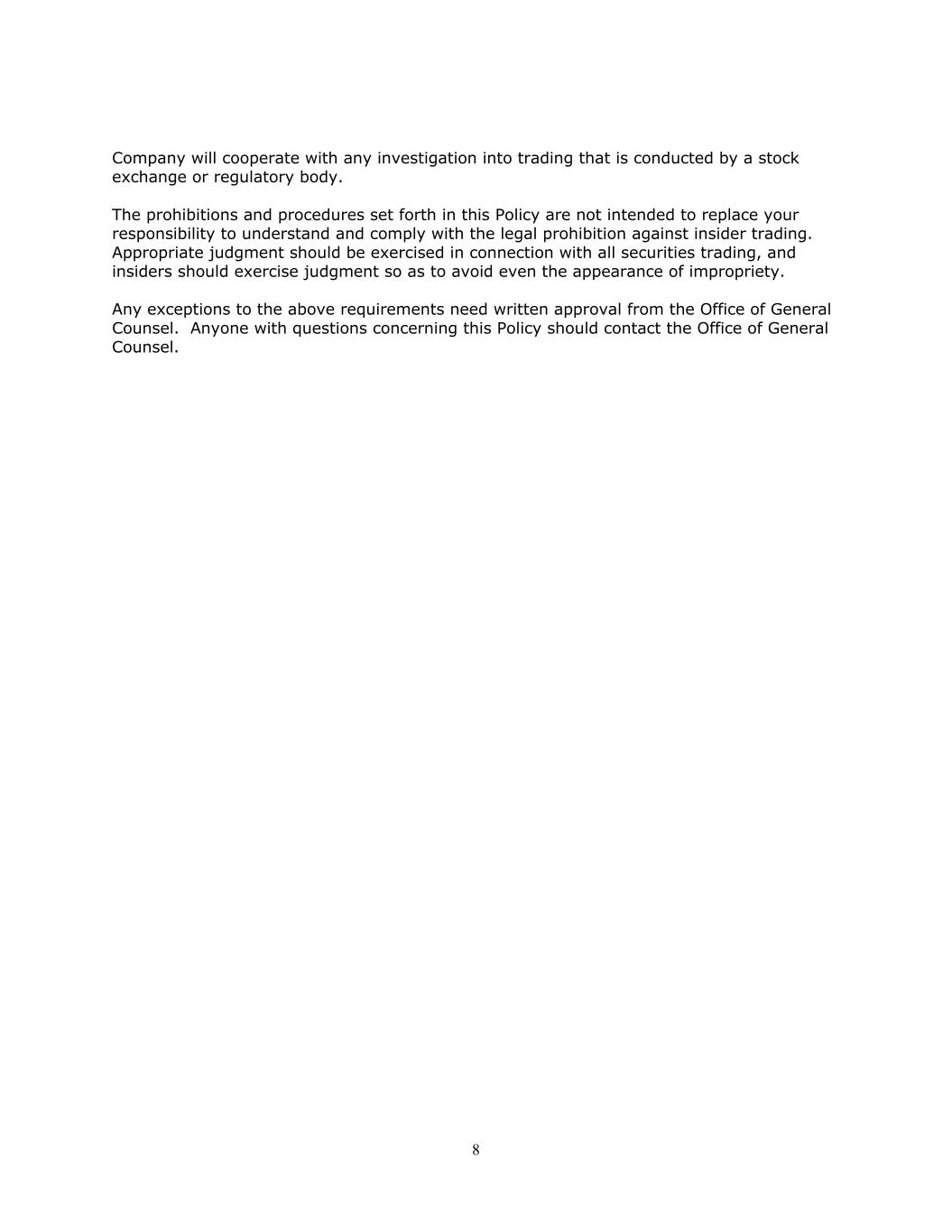
8 Company will cooperate with any investigation into trading that is conducted by a stock exchange or regulatory body. The prohibitions and procedures set forth in this Policy are not intended to replace your responsibility to understand and comply with the legal prohibition against insider trading. Appropriate judgment should be exercised in connection with all securities trading, and insiders should exercise judgment so as to avoid even the appearance of impropriety. Any exceptions to the above requirements need written approval from the Office of General Counsel. Anyone with questions concerning this Policy should contact the Office of General Counsel.







